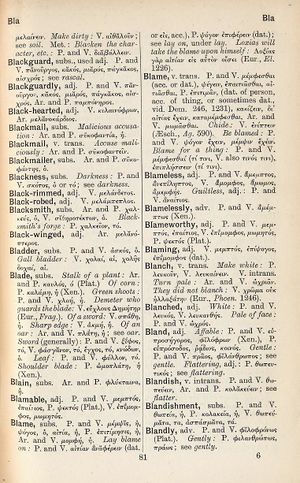blame: Difference between revisions
Γονεῖς δὲ τίμα καὶ φίλους εὐεργέτει → Reverens parentum sis, amicis beneficus → Die Eltern ehre, deinen Freunden tue wohl
m (Woodhouse1 replacement) |
mNo edit summary |
||
| Line 17: | Line 17: | ||
[[be blamed]]: [[prose|P.]] and [[verse|V.]] [[ψόγον ἔχειν]], [[μέμψιν ἔχειν]]. | [[be blamed]]: [[prose|P.]] and [[verse|V.]] [[ψόγον ἔχειν]], [[μέμψιν ἔχειν]]. | ||
[[blame for a thing]]: [[prose|P.]] and [[verse|V.]] [[ | [[blame for a thing]]: [[prose|P.]] and [[verse|V.]] [[μέμφεσθαι]]; (τί τινι, [[verse|V.]] also τινός τινι), [[ἐπιπλήσσειν]] (τί τινι). | ||
}} | }} | ||
Revision as of 14:58, 3 June 2020
English > Greek (Woodhouse)
substantive
P. and V. μέμψις, ἡ, ψόγος, ὁ, αἰτία, ἡ, P. ἐπιτίμησις, ἡ, Ar. and V. μομφή, ἡ.
lay blame on: P. and V. αἰτίαν ἀναφέρειν (dat. or εἰς, acc.), P. ψόγον ἐπιφέρειν (dat.); see lay on, under lay.
Loxias will take the blame upon himself: Λοξίας γὰρ αἰτίαν εἰς αὑτὸν οἴσει (Eur., Electra 1226).
verb transitive
P. and V. μέμφεσθαι; (acc. or dat.), ψέγειν, ἐπαιτιᾶσθαι, αἰτιᾶσθαι, P. ἐπιτιμᾶν, (dat. of person, acc. of thing, or sometimes dat., vid. Dem. 246, 1231), κακίζειν, δι' αἰτίας ἔχειν, καταμέμφεσθαι, Ar. and V. μωμᾶσθαι.
chide: V. ἐνίπτειν; (Aesch., Agamemnon 590).
be blamed: P. and V. ψόγον ἔχειν, μέμψιν ἔχειν.
blame for a thing: P. and V. μέμφεσθαι; (τί τινι, V. also τινός τινι), ἐπιπλήσσειν (τί τινι).

